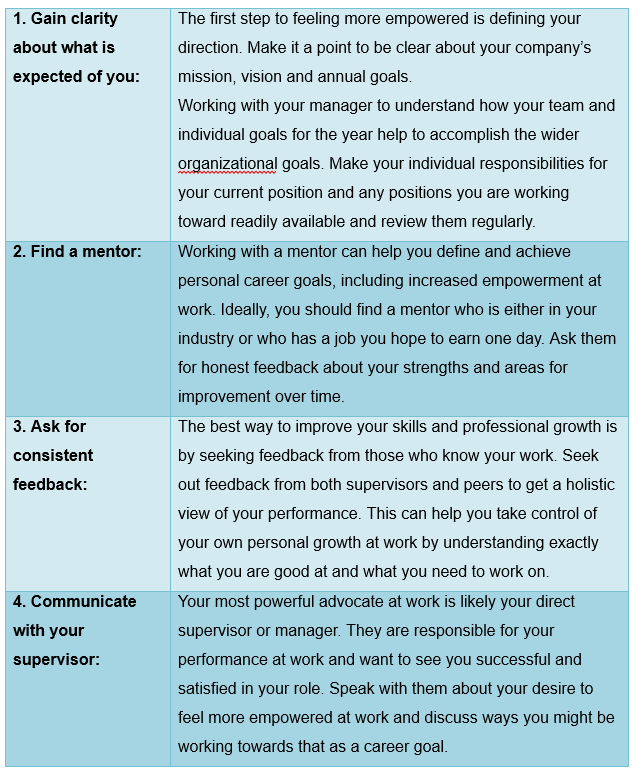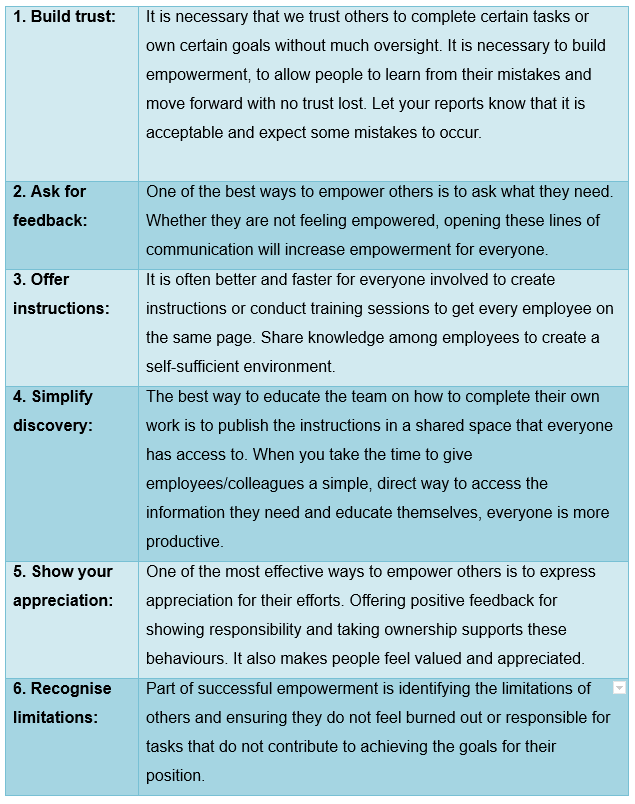Empowerment and Motivation

Empowerment is suggested to encompass individual goals (e.g., ability, autonomy, control and self-efficacy) and acts as a process for personal development (Hansson and Björkman, 2005); in addition, it is defined as a process through which people gain greater control over decisions and actions, set new goals and develop of methods and strategies to reach the goals as well as action for goal-fulfilment (Brookings and Bolton, 2000).
There are several ways you can begin to focus on your personal empowerment and take ownership in your work: firstly, you must define your direction; secondly, you must find a mentor, who can help you to define and achieve your personal goals. Thirdly, you must ask for consistent feedback to improve your skills. Lastly, you should speak and communicate with your supervisor, who wants to see you improve and s/he can offer guidance on how to achieve your goal(s).
Moreover, you can empower others by building trust, asking for feedback, offering instructions, simplifying discovery, showing your appreciation, and recognizing limits.
How is “psychological empowerment” perceived
Psychological empowerment is a concept originating from industrial-organizational psychology (Meng and Sun, 2019). The psychologically empowered state was considered a cognitive state characterized by a sense of perceived control, perceptions of competence, and internalization of the goals and objectives of the organization (Menon, 1999); also, autonomy, choice, responsibility, and participation in decision making in organizations are additional elements of psychological empowerment. In addition, psychological empowerment refers to an “intrinsic task motivation reflecting a sense of self-control in relation to one’s work and an active engagement with one’s work role (Scott et al., 2011).
Tips to empower yourself at work
Focusing on your own empowerment at work can lead to greater responsibilities and long-term success in your career. Below you can find several ways you can begin taking more ownership in your work (Indeed, 2020).

Tips to empower others at work
There are six ways to empower others at work: Build trust, ask for feedback, offer instructions, simplify discovery, show your appreciation and recognize limits. Below you can find several ways you can begin empowering others at work (Indeed, 2020).

Activity
Name of the activity:
Empowerment activity
The aim of the activity:
The goal of the activity is to help the participants to think of how empowerment could be used at the workplace. It will give them the chance to realise how they could be motivated by others (employer, supervisor, colleagues) and how they could act in a way to empower others (mainly colleagues).
Skills that the activity develops:
It enables participants to think, understand and realise how empowerment and motivation could advance their (working) daily life and consequently their productivity.
How many people the activity is suited for:
There should be at least 4 persons, forming two teams of two persons (minimum). Each team could be up to 5 persons (total 10 participants). More teams can be formed, if needed.
Time requirement for the activity:
15-20 minutes.
How many instructors are needed:
1
Other requirements for the activity:
There should be available one board and colored pens for each team.
Describe the activity in a clear and concise manner:
Each team is given one of the following two roles: 1) one team will have the role of trying to empower the others and 2) the other team will have the role of considering how employees could be empowered at the workplace. Each team will work independently and will focus on the given scenario.
The first team will have to write down how each individual could empower other colleagues at work, which actions can be taken, and which will be the outcomes of such an approach.
The second team will have to write down their personal thoughts and ideas regarding the practices, policies and actions that could promote their empowerment at the workplace; the aim of this activity is to collect data regarding how they imagine the perfect workplace, in which attention is provided to all employees.
The teams will work their scenarios for about 10-12 minutes. Then, both teams come together and each of them makes a presentation to the whole group. Discussion will follow and afterwards common issues/policies/practices can be raised. The overall aim of the activity is to give participants the chance to realise how they could be motivated by others (employer, supervisor, colleagues) and how they could act in a way to empower others (mainly colleagues); finally, the advantages of empowerment for all involved parties will be identified.
“Empowerment and the future of work”, Dr Peter Bloom, Open University
References
- Brookings, J. B. and Bolton, B. (2000) Confirmatory factor analysis of a measure of intrapersonal empowerment. Rehabilitation Psychology, vol.45, pp.292–298.
- Hansson, L. and Björkman, T. (2005) Empowerment in people with a mental illness: reliability and validity of the Swedish version of an empowerment scale, Scandinavian Journal of Caring Sciences, vol.19, pp.32–38.
- Indeed (2020) How to empower yourself and others, 29 December 2020, Indeed Editorial Team. Accessed at: https://www.indeed.com/career-advice/career-development/empowerment
- Meng, Q. and Sun, F. (2019) The impact of psychological empowerment on work engagement among university faculty members in China, Psychology Research and Behavior Management, vol.12, pp.983-990.
- Menon, S.T. (1999) Psychological empowerment: Definition, measurement, and validation. Canadian Journal of Behavioural Science / Revue canadienne des sciences du comportement, vol.31. no.3, pp.161–164. https://doi.org/10.1037/h0087084
- Raub, S., Robert, C. (2010). Differential effects of empowering leadership on in-role and extra-role employee behaviors: exploring the role of psychological empowerment and power values. Human Relations, vol.63, no.11, pp.1743–1770.
- Sigler, T.H. and Pearson, C.M. (2000) Creating an empowering culture: Examining the relationship between organizational culture and perceptions of empowerment, Journal of Quality Management, vol.5, pp. 27-52, 10.1016/S1084-8568(00)00011-0
- Scott ES, Gang W, Stephen HC. Antecedents and consequences of psychological and team empowerment in organizations: a meta-analytic review. J Appl Psychol, vol.96, no.5, pp.981–1003. doi:10.1037/a0022676
- Udod, S.A.; Hammond-Collins, K. and Jenkins, M. (2020) Dynamics of emotional intelligence and empowerment: The perspectives of middle managers, SAGE Open. April 2020. doi:10.1177/2158244020919508

